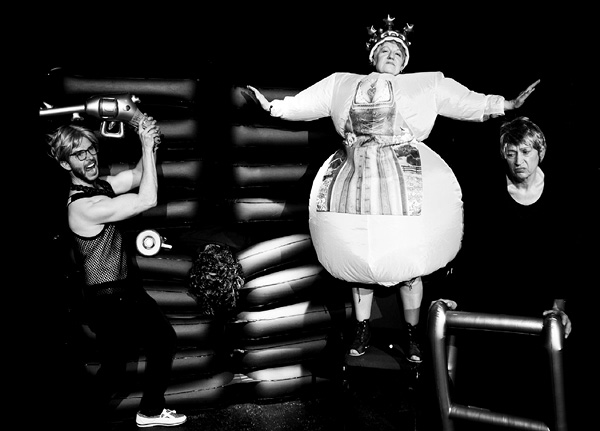
DEAD AT LAST, AT LAST NO MORE AIR
first performed on May 6, 2014
Camden People’s Theatre, London, UK
performed thirteen times in 2014
JUST A MUST / VANDA BUTKOVIC
Simon Donger, Meredith Oakes, Diana Damian Martin, Ana Vilar, Berislav Juraic, Denise Heinrich-Lane, Niall Murray, Andrew McKenzie, Ingrid Evans, Jeremy Hancock, Delia Remy, Tom Jacobs
London, United Kingdom
586025927i586025927n586025927f586025927o586025927@586025927j586025927u586025927s586025927t586025927a586025927m586025927u586025927s586025927t586025927.586025927c586025927o586025927m
DEAD AT LAST, AT LAST NO MORE AIR
JUST A MUST / VANDA BUTKOVIC
Werner Schwab’s final work, “Dead At Last, At Last No More Air,” also known as a theatre-extinction comedy, is a brutal, irreverent and bizarrely comical piece about what happens when an emerging stage production is sabotaged by outsiders.
Following our last production of Elfriede Jelinek’s Sports Play, our priority remains in understanding the ways in which postdramatic theatre, particularly iconic continental plays that have not yet been translated or adapted here, might be able to construct a more situated practice. For us, staging Schwab is not merely an exercise in adaptation or interpretation. The play itself, in its humorous, sharp and nuanced critique of the stifling theatrical institution and the dangers of conservatism and nationalism, echoes clearly with the current political and cultural context, bringing forth productive situations and conceptualisations that hold the ability to contribute to a wide range of conversations.
In discussing the play, Director Vanda Butkovic asserts, “Amongst many themes that Schwab is proposing in his final text, the most prominent for me is the death of theatre. Schwab is suggesting that the theatre space is abused by pointless texts and ‘make believe’, used as political mouthpieces. I feel as a theatre community we are in a situation where the very purpose of theatre as a tool for commentary and dialogue is not only threatened, but totally undermined. I am not hopeful about this—I am afraid. I think death of theatre will have the same consequences for the society as the extinction of bees will have for the earth.”
Simon Donger’s scenography takes its cue from the play’s key operating metaphor, air, and consists of inflatable mattresses arranged as a progressively changing and deflating structure. This acts, particularly at the onset, as an interpretation of the ‘theatre stage on the stage,’ engaging with a neo-Brechtian register that destabilises both the real and the representational.
Air thus becomes a discursive material onstage, rather than an operative metaphor. Actors have to respond to the spatial dynamics imposed by such a malleable set. Thus, the set is not merely an aesthetic container for the text but rather it enables a more embedded, embodied and intertextual conversation with the dialogue itself. Similarly, we wanted to invite the audience into the unfolding performance, playing between dichotomies and homogenisation, order and chaos. After all, dirt remains a powerful material and image in the neoliberal era.